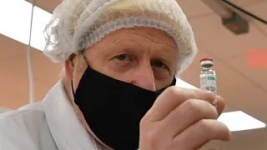COVID-19 'Pandemic'
- Thread starter Ocean Breeze
- Start date
You are using an out of date browser. It may not display this or other websites correctly.
You should upgrade or use an alternative browser.
You should upgrade or use an alternative browser.
CNN isnt biased!
- CNN President Jeff Zucker: “There is a term for what Rudy Giuliani is suspected of being which is ‘useful idiot.’”
- Zucker: “On the Rudy Giuliani story, this is a really important story. It gets tied to the Hunter Biden email disinformation campaign.”
- Zucker: “With regards to the filth that they're spreading, the child pornography [allegations] and all of that. I do not believe that we should be covering those allegations even if they're out there on Newsmax.”
- CNN call participant: “If the NFL was running the government, then things would probably be in much better shape than they are.”
- CNN President Jeff Zucker: “Trump continuing to undermine election integrity with baseless claims of fraud. OK? And he's continuing to do it. And that leads to the question of whether or not Trump, in himself, is a national security threat, in light of what he's doing and in light of what he did in the debate.”
- Zucker: “The Breitbart, New York Post, Fox News rabbit hole of Hunter Biden, which I don't think anybody outside of that world understood.”
- Zucker: “The Wall Street Journal reported that their review of all corporate records showed no role for Joe Biden on the Chinese deal, and yes, I do put more credibility in The Wall Street Journal than I do in the New York Post.”
- CNN Senior VP Cynthia Hudson: “The only reason [Cubans in Miami] are supporting Trump is because of that [Biden is socialist] narrative—and that narrative, and the fact that sadly, I have to say, there's a population that's very attracted to bullies. No one is countering it properly in Florida, the Cubans are going to vote for Trump and that's terrifying.”
Surprise, surprise $41 Million isn't enough, Is it a surprise that construction in Montreal would be over budget and not on schedule?
Construction problems prevented National Research Council from opening vaccine facility on schedule
CNN President Jeff Zucker: “This is a president who knows he's losing, who knows he's in trouble, is sick, maybe is on the aftereffects of steroids or not. I don't know. But he is acting erratically and desperately, and we need to not normalize that.”- Zucker: “You know, this is what we've come to expect for the last three and a half years, four years, but it clearly is exacerbated by the time that we're in and the issues that he's [Trump] dealing with. I think that we cannot just let it be normalized. He is all over the place and acting erratically, and I think we need to lean into that.”
- Zucker: “Frankly, if we've made any mistake, it's been that our banners have been too polite, and we need to go well after Lindsey Graham.”
- Marcus Mabry, CNN digital VP of global programming: “Yeah, I was just going to say, if you're going to talk about the story, I think it's unavoidable that you have to talk about the naked racism of Tucker Carlson. Because that's really what drove this anti-diversity push, you know, Trump watches Tucker Carlson's show and then reacts. And just as sort of the white supremacy hour they have on Fox News every night, I think it's the --- You can't disconnect the two.”
- Stephanie Becker, CNN field producer: “On the issue of why it's important to get the transition going right, the 9-11 report talks about one of the problems was that the trouble that was brewing that lost during the transition. So, if you want a good, concrete example of what happens when you don't have a good transition, well, look at the Twin Towers
What??? Clinton screwed up the transition? Besides stealing stuff from the White House?
The vaccine has already been tested on human guinea pigs.
Not near enough. To be safe takes years of tests, not a couple of weeks. At best it will be benign. It could be worse than the disease.
Can you give evidence for this?Maybe not financially as much, but through regulation cutting and streamlining they sure as heck did
At one point, Britain had given the most money of any country for funding for a vaccine.
The reality is that the US launched Operation Warp Speed but Britain just got there even quicker:
No, Pfizer’s apparent vaccine success is not a function of Trump’s ‘Operation Warp Speed’
So is Pfizer part of Operation Warp Speed or not? Yes and no. (yahoo.com)Can you give evidence for this?
At one point, Britain had given the most money of any country for funding for a vaccine.
The reality is that the US launched Operation Warp Speed but Britain just got there even quicker:
No, Pfizer’s apparent vaccine success is not a function of Trump’s ‘Operation Warp Speed’
While other pharmaceutical companies did take federal funds to develop a vaccine, Pfizer declined to do so, the only one of the major prospective developers to go it alone.
At the same time, on July 22, Pfizer agreed to a $1.95 billion deal with the Trump administration “for large-scale production and nationwide delivery of 100 million doses of a COVID-19 vaccine in the United States following the vaccine’s successful manufacture and approval.”
Technically, that agreement has nothing to do with the development of the vaccine. But it also appears to undermine the claim that Pfizer is operating entirely outside Operation Warp Speed.
A senior administration official told Yahoo News that since “the early days of March when President Trump convened pharmaceutical companies at the White House, Pfizer has been a part of the incredible public-private partnership forged to combat the coronavirus pandemic. Additionally, the nearly 2 billion dollars awarded to Pfizer will go a long way in the manufacturing and distribution of the Pfizer vaccine in development.”
Does Operation Warp Speed Deserve Credit for Pfizer’s Success in Developing a COVID Vaccine? - The Dispatch Fact Check
Operation Warp Speed is a federal initiative developed earlier this year with the goal of making and distributing “300 million doses of safe and effective vaccines with the initial doses available by January 2021,” according to the U.S. Department of Health and Human Services.
Pfizer did not take federal funding for the research and development of its vaccine, but it is in fact participating in Operation Warp Speed as a supplier, company spokesperson Sharon Castillo told The Dispatch Fact Check in an email.
“Pfizer is one of various vaccine manufacturers participating in Operation Warp Speed as a supplier,” Castillo said. “While Pfizer did reach an advanced purchase agreement with the U.S. government, the company did not accept BARDA funds for the research and development process. All the investment for R&D was made by Pfizer at risk.”
BARDA is the Biomedical Advanced Research and Development Authority, an office of the Department of Health and Human Services.
Creating some confusion about Pfizer’s involvement in Operation Warp Speed, however, Kathrin Jansen, a senior vice president and head of vaccine research and development at Pfizer, told the New York Times that, “We were never part of the Warp Speed. We have never taken any money from the U.S. government, or from anyone.”
Castillo clarified Jansen’s statement and said that “Dr. Jansen was referring to the company not taking federal funding from BARDA for the R&D process of our vaccine candidate. We are part of Operation Warp Speed as a supplier.”
So, while it’s true that Pfizer did not take federal money to accelerate research and development for this vaccine, the company did indeed benefit from Operation Warp Speed, according to James Capretta, resident fellow at the American Enterprise Institute.
“They did accept a $1.95 billion advance purchase agreement for 100 million doses (at $19.50 per dose) and that helped them take on the risk of developing this vaccine,” said Capretta. “There is no question that $1.95 billion from Operation Warp Speed in the form of an advance purchase helped them a lot.”
It’s also worth noting that the FDA is not directly involved with Operation Warp Speed. “FDA's role is to determine if the products coming out of Operation Warp Speed are safe and effective,” Capretta explained. “It is theoretically possible that the FDA will reject some of the Operation Warp Speed candidates as not being sufficiently safe or effective.”
His point of view? Or the point of view that makes him popular on a message board?You won't get sense out of Blackie... all he'll post is stuff that suits his point of view and not reality or facts.
Lets hope it is, everyone would like to see that. Unfortunately though the chart I linked was reflective of the numbers for October.Chances are it'll be even lower than 24th now because the number of deaths is decreasing.
Movies suck .... except for the Clint Eastwood ones.
I remember when my dad told me as a kid that he is Stan Laurel's son.Movies suck .... except for the Clint Eastwood ones.
Oh I do believe cinemas are dying out, you asked if I could go to one in Calgary, and the answer was yes. Doesn't mean I do or that I would, they are grossly overpriced and loud. I prefer to watch movies at home.Not in Calgary according to Mockingbird
During Corona? Isn't that the conversation?Oh I do believe cinemas are dying out, you asked if I could go to one in Calgary, and the answer was yes. Doesn't mean I do or that I would, they are grossly overpriced and loud. I prefer to watch movies at home.



